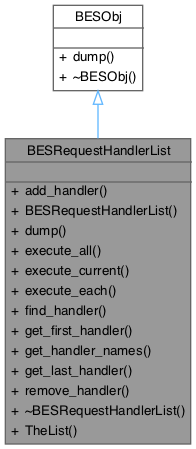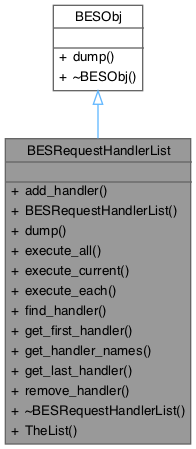The list of registered request handlers for this server; a singleton. More...
#include <BESRequestHandlerList.h>


Public Types | |
| typedef std::map< std::string, BESRequestHandler * >::const_iterator | Handler_citer |
| typedef std::map< std::string, BESRequestHandler * >::iterator | Handler_iter |
Public Member Functions | |
| virtual bool | add_handler (const std::string &handler_name, BESRequestHandler *handler) |
| virtual void | dump (std::ostream &strm) const |
| dump the contents of this object to the specified ostream | |
| virtual void | execute_all (BESDataHandlerInterface &dhi) |
| virtual void | execute_current (BESDataHandlerInterface &dhi) |
| virtual void | execute_each (BESDataHandlerInterface &dhi) |
| virtual BESRequestHandler * | find_handler (const std::string &handler_name) |
| virtual Handler_citer | get_first_handler () |
| virtual std::string | get_handler_names () |
| virtual Handler_citer | get_last_handler () |
| virtual BESRequestHandler * | remove_handler (const std::string &handler_name) |
Static Public Member Functions | |
| static BESRequestHandlerList * | TheList () |
Detailed Description
The list of registered request handlers for this server; a singleton.
For a type of data to be read by the BES, there must be a request handler that can read those data. Typically, a request handler reads information from files stored on the computer running the BES, although it is possible for a request handler to read data from remote machines, other data services, relational databases, et cetera.
Instances of BESRequestHandler use the BESDataHandlerInterface object to get a ResponseObject that they then 'fill in' with the 'requested' information. The ResponseObject holds instances of other objects like DAS, DDS, DMR, or version.
The request handlers are registered with this request handler list using a short std::string as the key value. Other parts of the BES can access this singleton class to find a specific handler using that std::string.
- See also
- BESDapModule::initialize() to see where various handlers used to process requests for DAP2 and DAP4 responses are registered along with the std::strings that can be used to access the handlers using this class'
file_handler()method.
Definition at line 66 of file BESRequestHandlerList.h.
Member Typedef Documentation
◆ Handler_citer
| typedef std::map<std::string,BESRequestHandler*>::const_iterator BESRequestHandlerList::Handler_citer |
Definition at line 80 of file BESRequestHandlerList.h.
◆ Handler_iter
| typedef std::map<std::string,BESRequestHandler*>::iterator BESRequestHandlerList::Handler_iter |
Definition at line 81 of file BESRequestHandlerList.h.
Member Function Documentation
◆ dump()
|
virtual |
dump the contents of this object to the specified ostream
This method is implemented by all derived classes to dump their contents, in other words, any state they might have, private variables, etc...
The inline function below can be used to dump the contents of an OPeNDAPObj object. For example, the object Animal is derived from BESObj. A user could do the following:
Animal *a = new dog( "Sparky" ) ; cout << a << endl ;
And the dump method for dog could display the name passed into the constructor, the (this) pointer of the object, etc...
- Parameters
-
strm C++ i/o stream to dump the object to
Implements BESObj.
The documentation for this class was generated from the following file: